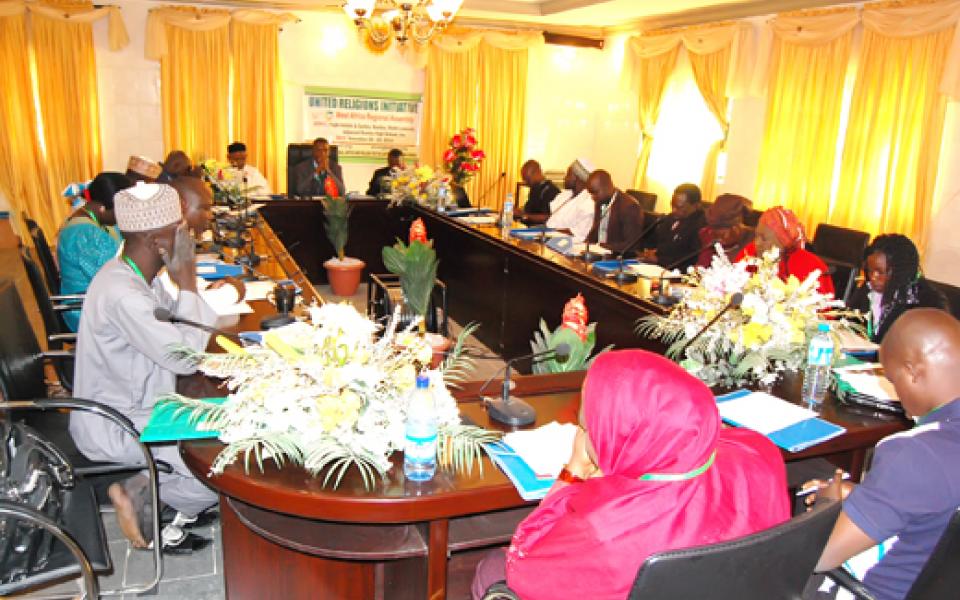
From November 20-22, 2014, 35 CC leaders and/or delegates representing 15 URI Cooperation Circles in West Africa gathered at the Fajib Hotels and Suites in Jos, Nigeria, for the first URI West Africa Regional Assembly. Among the Dignitaries present were Hon. Elisha Buba Yero, URI Global Council Trustee, Mr. Chris Ogbonna, Secretary General of the Plateau Peace Practitioners Network (PPPN), Mr. Dan Jumaa Ojei, Director of ICON Afrique, Hajiya Nafisatu Musa, Community Health and Trauma Healing Specialist with APURIMAC Onlus-Nigeria, among others. The URI West Africa Regional Assembly provided a great opportunity for CC leaders to deepen the impact and broaden the possibilities for interfaith contribution to peace within our sub-region and in the world. The Assembly focused on capacity and skill-building practices for interfaith work, including the specialized URI Energizing the Network training that can be replicated and shared globally. The Assembly as provided an opportunity for CCs to make presentations on their work, achievements and challenges.
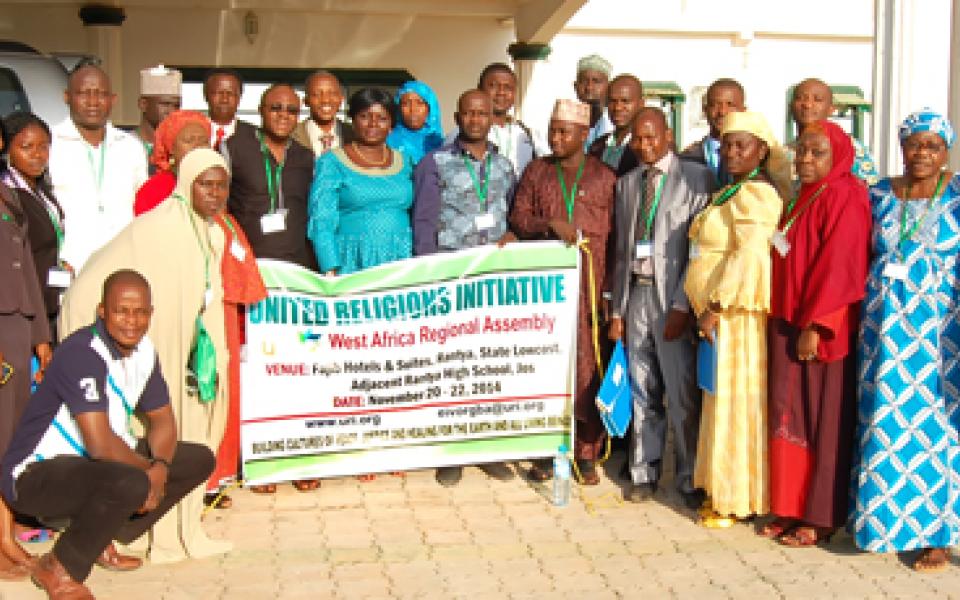
CC leaders and delegates arrived Jos, Nigeria on November 20, 2014. The Assembly officially opened at 8am the following day with Interfaith Prayers. There were Christians, Muslims, African Traditional Worshippers, Humanists, including few others who professed Love as their religion. Participants then took turns to introduce themselves, one after the other, round the table, stating their names, their Cooperation Circles (CCs), their work and locations. Emmanuel Ande Ivorgba then formally welcomed participants and also introduced Hon. Elisha Buba Yero, URI Global Council Trustee and Emmanuel Korsi Senyo, URI West Africa CC Laiason Officer, respectively. Goodwill Messages, sent in from Rev. Victor Kazanjian, URI's Executive Director, Dr. Mussie Hailu, URI's Africa Continental Coordinator and Liam Chinn, URI's Co-Director of Global Programs, Evaluation and Learning, were then delivered to participants by Amb. Frank Inalegwu Uji representing Society for Life CC, Mallam Usman Mohammed Inuwa, representing FACIS CC and Hajiya Amina Kazaure representing Interfaith Council of Muslim and Christian Women Associations CC, respectively. The Keynote Address was delivered by Hon. Elisha Buba Yero.
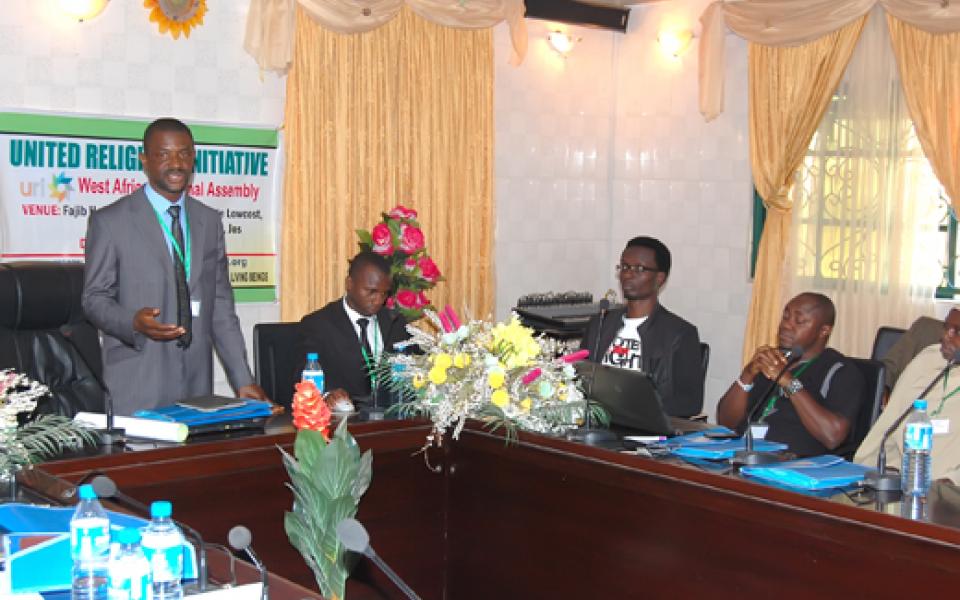
In his Goodwill Message to the Assembly, the Rev. Victor Kazanjian, URI Executive Director emphasized that the “beauty and richness of the traditions of the people of West Africa is a gift to URI and to all humanity”. Continuing, Victor said “For all of us whose lives are dedicated to interreligious understanding, dialogue and peacebuilding, the United Religions Initiative, and in particular URI West Africa, is a beacon of hope at a time when the world is overshadowed by the clouds of conflict”. He thanked CC leaders for prevailing over the extraordinary challenges of conflict and ebola in West Africa to create a place of gathering, bringing peoples of different religious beliefs and cultural traditions together in the great movement to bridge differences and create communities and cultures of peace. He concluded with a solemn prayer and invitation to participants to fully commit themselves to “living out URI's purpose in our daily lives”, and we do this, “may the power of our convictions infuse purpose into our actions, and may peace prevail in West Africa and the world.”
Dr. Mussie Hailu's Message to the Assembly focused on the urgent need to work with and support religious leaders in Africa to work along with their respective governments and the African Union Commission, in seeking creative and innovative ways to countering violent extremism, radicalization and terrorism in Africa as terrorism continues to pose serious threats to peace and security in Africa. He called on participants to have some moments for deep reflection on the scourge of conflicts in Africa and how these have become major impediments to our socio-economic development. Therefore, the need to promote peace, security and stability as a prerequisite for the implementation of Africa's Development Agenda, he observed, is urgent. Dr. Mussie also described URI as a bridge-building organization, and not a religion. It respects the uniqueness of each religion, spiritual expression and indigenous traditions”. In this vein therefore, rather than dividing us, our religious, spiritual and cultural traditions, must nourish us and provide the foundations to building community and respect for another. He then called on participants to urgently make the compassionate voice of religion and morality to “sing out loud and clear in our dangerously polarized world in order to challenge the voices of hatred, exclusion, chauvinism and extremism”. One very practical way to achieving this, he emphasized is through the teaching and practice of the Golden Rule which says “treat Others the way you want to be treated.”
In his Goodwill Message, Liam Chinn, briefly encapsulated the historical origins of URI and the great significance of CCs. From the beginning, “Cooperation Circles”, he said, were designated as “the center and life of URI”. The vitality of our CCs and our active engagement in the network, he emphasized, is very essential to the fundamental purpose of URI. In order to realize the full potential of the URI Network therefore, Liam encouraged CC leaders to ensure good communication is established and sustained among CCs, with the URI staff and with the URI Trustees, and especially as we continue to evolve and grow together, “the overall impact will depend on even more active exchange of ideas among CCs, and even more partnerships and collaboration”. He welcomed CCs leaders and invited them to share, learn together and get inspired.
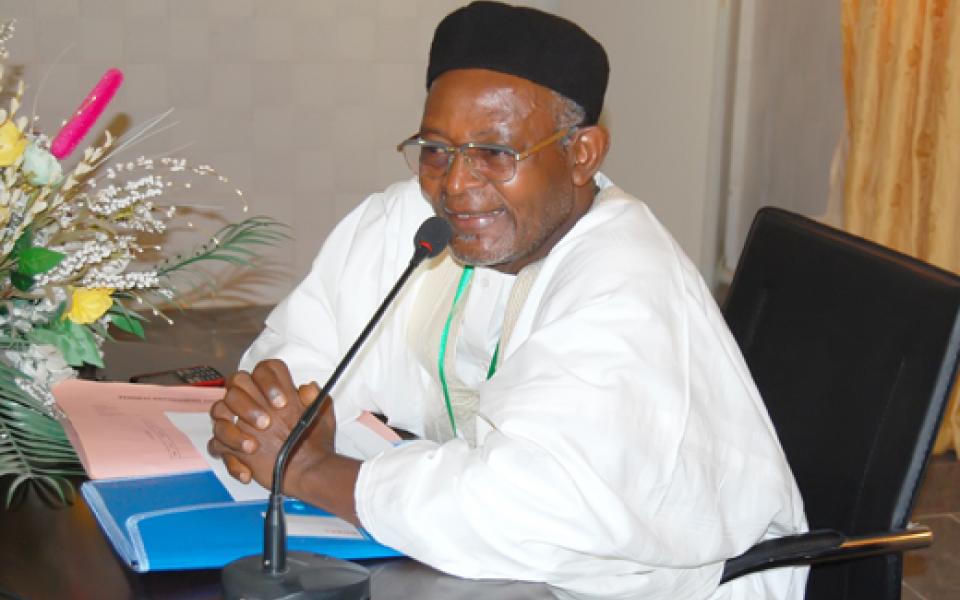
Hon. Elisha Buba Yero, the Wakilin Kpop Ham and URI Global Council Trustee, delivered the Keynote Address. In his address, the Hon. Elisha called for unity and more unity as the URI PPP do stress. “When the building blocks are strong”, he emphasized, “the waves and winds against the building cannot shake the structure to shackles”. He thanked the CC leaders for agreeing to come together despite the challenge and fear of ebola. The rest of the address focused on opportunities for CC growth and expansion at all levels, through partnerships and the building of coalitions. His address also identified few challenges, in terms of distances, communication and funding, etc.
ENERGIZING THE NETWORK TRAINING:
After a general overview of the training, participants broke into groups to discuss:
- What does URI mean to you?
- Concrete benefits of belonging to the URI network
- Potential benefits of belonging to the URI network
This session turned out to be very interesting, lively and highly engaging. On what URI means, below were some of the responses:
- A shelter to every human being, providing motivation and cultivating a sense of belonging
- A platform that cultivates oneness and appreciates our diverse faiths
- An umbrella body that coordinates CC activities
- A global movement promoting greater understanding and cooperation among the world's diverse religions
- In terms of concrete and potential benefits of belonging to the URI network, some of the responses were:
- Membership of URI adds credibility and integrity to the work of CCs
- Provides opportunity for service, partnership, sponsorship. networking and collaboration with other CCs and individuals
- Information exchange, learning, capacity building opportunities and sharing of good practices
- Creating visibility, publicity, friendships, etc.
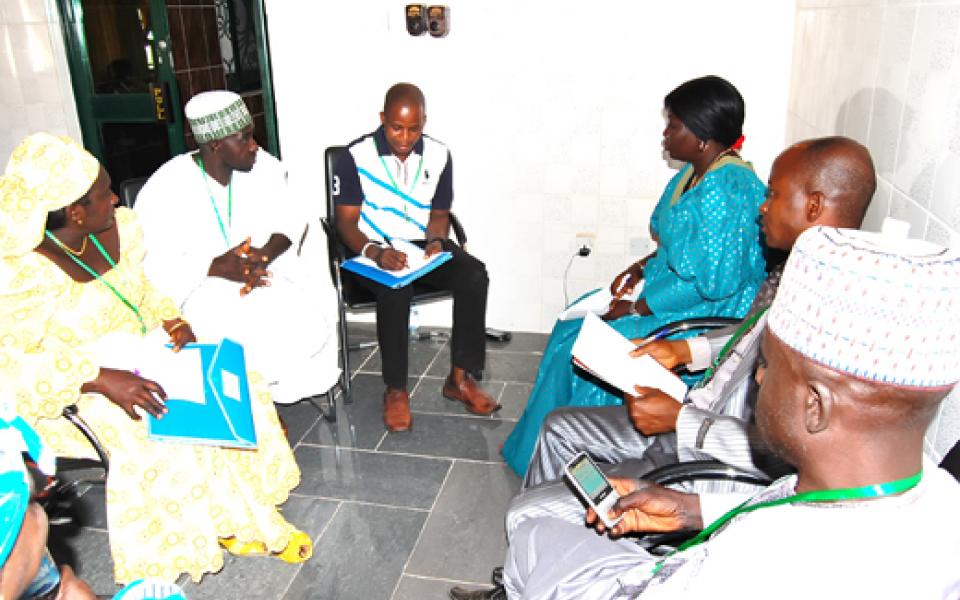
The Energizing the Network training also focused on strategies for strengthening communication within the network. Participants also shared ideas on how to gather and present CC stories that are analytical and qualitative. The training ended with a special session on “Planning the Way Forward” for URI West Africa in 2015 and beyond, in terms of needs, priorities and specific activities. Some of the Specific Priorities identified include:
- Adequate publicity, knowledge management and information sharing among CCs, Regional Leadership, the Global Support Team and the Trustees
- Capacity building, networking, resource mobilization, research and documentation
- Aggressive CC membership drive, using our existing networks and partnerships, and especially targeting grassroots organizations, schools, religious institutions, including governments at all levels.
- Learning/exchange visits to be undertaken by CCs
- Annual CC retreat
